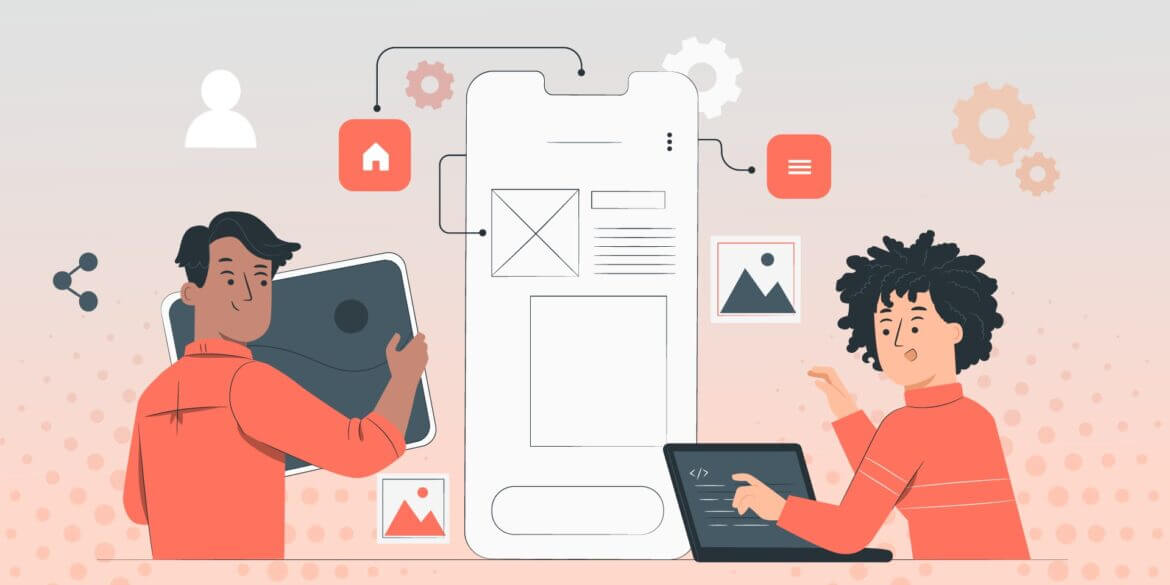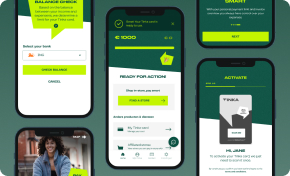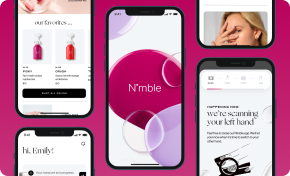If you are here to understand and learn more about mobile app development, then you came to the right spot. If you’re not a mobile app developer but you want to better understand this topic, then keep on reading this article’s part 1, specially created for you. Your idea for a mobile app might be amazing, you also might be a start-up founder moving to the next stage of funding, or the enterprise you’re working at might be aiming to innovate with a new app.
Our guide will reveal the different aspects involved in app ideation, development, design, running & selling. Let’s go through what a successful mobile app development cycle involves:
Mobile App Development for a Competitive Edge
Developing Mobile Apps that Engage Your Customers with Your Brand
Explore Mobile App DevelopmentThe market for mobile apps
Mobile app development has become quite common, while mobile apps changed consumer expectations, behavior, and last but not least, the processes performed at their workplaces. This is a big advantage for the market.
Pre-development
This process involves the basics of mobile apps, and the market, as well as avoiding the most common mistakes in the ideation & pre-development stages, deciding between in-house or agency development, strategy & tech stack choices, choosing a mobile app development company as a digital partner, and having the right cost expectations.
Development
Common development methodologies, avoiding mistakes during the development process, and going through all the development phases.
Post-development
This involves maintenance & costs to keep your app running smoothly, promoting the mobile app, commercializing it, and how to avoid mistakes after you launched the app.
The information is complex and our mobile app development guide aims to offer you complete information about how to build a mobile app in 2022.
The mobile app market
Let’s start with the basics and don’t miss the common mistakes section! You’ll discover lots of interesting information & statistics on the development of mobile apps, the right market for them, and how much they fill our lives right now as consumers, professionals, or stakeholders.
What is a mobile app?
The software application designed exclusively for use on smartphones and tablets is a mobile app. Of course that most devices run on various operating systems (OS) and most mobile apps are designed to run on iOS (iPhone) and Android, operating systems.
The mobile app operating systems – Android and iOS
The most commonly used mobile OS in 2021 was Android, having around 72% of the market, while iOS had only 27.47% of the same market. Over the past decade, the market has strengthened. Two dominant players were left on the market and this simplified a lot of things for mobile developers & the people behind mobile app projects.
If you want to stay informed, just keep in mind that the worldwide market share of Android vs. iOS doesn’t reflect the total number of mobile apps developed for each OS, in this case, is much closer, so the Android apps available on Google Play are 3,482, 452 while the iOS apps available on App Store are 2, 226, 823. iOS still has a higher market share in more advanced economies, compared to the worldwide average. Only in the UK & US, iOS has over 50% market share, benefiting from being ahead of Android.
Market intelligence also often tells the app owners that the consumer who owns an Apple mobile device represents a higher income demographic than the consumer who owns an Android device. This means iOS is a far more important market to develop mobile apps for. Even though its global 27.5% market share might suggest the opposite.
Why develop a mobile application?
Before continuing, you should know that “why develop a website or software solution?” was the question frequently asked 20 years ago.
Mobile apps have had a massive influence in Changing consumer behavior patterns, processes across sectors & industries, and business models have been hugely influenced by mobile apps over the past decade. People use them nowadays for everything from dating, ordering food, opening smart locks, ordering taxis, shopping online, booking flights, or consuming media, so the apps they love using became part of their lives.
In April 2012, the Tinder app and Instagram app for Android was launched, so we’re talking about 10 years ago. Around the same time, ridesharing app Uber and food delivery apps like Delivery Hero & Deliveroo launched in 2011.
In a relatively small period, we’ve become so familiar with using apps that we find it odd when a service or business doesn’t have one. If might find it interesting that in 2021:
- We spent 90% of our time interacting with the apps on our smartphones
- Consumers spent around 2 hours/day using their favorite apps
- Since 2019, the time spent using apps increased by 30%
The fact smartphones are easy to reach & use anywhere offers a quick & convenient way to get things done. The new format was also harnessed to create Entirely new business models & ways of doing things was also harnessed to create by the new format. The chances are high that a decade from now translation apps will have broken down all language barriers in professional communication, opening up a new world of collaboration & cooperation.
The businesses that won’t have a mobile app in the next 10 years will be the exceptions rather than the rule. The probability of having a new generation of quickly growing app-based businesses that will be hugely valuable is also pretty high.
The business case for mobile apps
Apps are mainly developed aiming their use will achieve efficiency while generating a return on investment.
Let’s talk about airline apps with mobile check-in and boarding cards. Adopting them has reduced the time needed to check in flight passengers, while also reducing staff costs. Most passengers also find them more convenient than having to print & carry a paper document, and this led to a huge improvement in customer satisfaction.
There are also apps with a non-profit business model for a foundation or a charity, like the World Wildlife Federation’s (WWF) whose mission is conserving nature and reducing the most pressing threats to the diversity of life on Earth, rather than selling something or making money out of their app.
Raising individual awareness & behavioral change is key to a charity achieving its mission. Several apps rely on this ideology, setting daily challenges on energy, food, and nature, aiming to help stop the climate change
The pre-development phase of a mobile app
Before you start developing a mobile application there is plenty to do. The first step is to determine if you really should develop it at all. If the answer is still positive, you have another long list of considerations and decisions to make before development starts.
Making Product Discovery Easier and More Accessible
Turn Your Vision into a Reality in Four Weeks with Our Expert-Driven TechBoost Program
See Product Discovery ServicesCommon reasons why mobile app projects fail
Before committing the time and money required to develop a quality mobile app that stands a fair chance of commercial success, make sure you are not about to commit one of several common mistakes. If you carefully avoid these pitfalls, you’ll already be well on the way to a successful app, whatever its goals are.
Don’t reinvent the wheel
The number one reason why mobile apps fail to take off is that they don’t add any value. Not every app needs to be 100% ground-breaking original to be a success but there’s also no point in developing one that does nothing new.
Carefully consider what added value the app you have in mind will offer users compared to what’s already out there. What are your apps’ selling points? What does it do that most similar existing alternatives don’t? Are these features or functionalities enough to convince users to switch to your app? How quickly and easily could larger competitors replicate anything new your app does that gives it a competitive advantage?
Does it make sense to build your app from the ground up? If it’s a general utility app for something like making bookings or other functions many businesses have, there are almost certainly apps that have been developed by someone else you can white label for the same result at a fraction of the cost.
Your idea needs validation
Lots of new businesses fail because the founders are convinced they are solving a problem that turns out not to be much of a problem at all. Or they offer something new they think will be a hit but just don’t catch on.
Market intelligence company CB Insight says 42% of startups fail because there is no market need for their products, apps, or services.
When we are enthusiastic about something it can be easy to lose objectivity. Make sure you validate your app idea before committing to its development. Creating a simple prototype or MVP and testing it with potential users is one way to do this but there are different techniques and approaches which can make sense for your particular app idea.
Our colleagues at UpTech have a great resource on how to validate app ideas pre-development.
Costs shouldn’t be underestimated
We’ll go into this in more detail but developing a quality app isn’t cheap, even if it’s not hugely complex. And if it is complex, it can be very expensive. Even a simple app developed to a high level of quality can be expected to cost in the tens of thousands of pounds and cutting costs runs the risk of an amateurish product that will severely reduce the chances of success.
The business plan is important
Even if you have the budget to develop your mobile app to the highest standards it might not make business sense to do so. You need a business plan to analyze if the resources that will go into developing and running the app will generate enough value, revenues, efficiencies, customer satisfaction and engagement, learning outcomes, or any of the other reasons apps are developed, are justified.
Leading Development Teams for Your Success
Optimize Your Project Execution with Our Dedicated Development Teams
Get Your Development TeamHow much will it cost to develop the app? How much will it cost to run the app, and keep it available and working for 100 or 10 million users? When are revenues expected to be generated? How quickly will they grow? If direct revenue won’t be generated how will return on investment (ROI) be measured?
Business plans always involve some level of guesswork. But not sitting down and carefully calculating all outgoings and incomings in realistic best and worst-case scenarios is asking for trouble.
A marketing strategy will be needed
Regardless of the kind of mobile app, you plan to develop, its success will ultimately depend on getting it onto people’s phones by convincing them to download it. And then keeping them using it. That won’t realistically happen by itself, no matter how good your app is.
You need a marketing or promotional strategy and the budget to execute it at the scale your business plan estimates necessary. If you are entering a competitive market or trying to establish a new one, that will be a major undertaking.
Even a company developing an app for employees to use or a business developing one for existing customers needs buy-in. That, in turn, will rely on a promotional strategy.
It’s rarely just an app
Developing and launching a mobile app is very rarely a case of just creating the app. You’ll probably need a promotional website and quite possibly a web-based version of the app too. Developing your app’s back end might also potentially be a much bigger project than its front end.
Your work doesn’t end with the launch, it only begins
Especially if successful, your mobile app will involve more work after it has been launched than is involved in the development and release. Mobile app development never really ends and you will have to keep on top of maintenance and continuous iterations to iron out bugs, improve usability and add functionalities.
Who is going to build your app?
When you are convinced you have a validated app concept, a solid business plan, and the funding and promotional strategy to successfully launch it, you are ready to develop it. And the first big choice will be who are you going to trust to build it. In part 2 of this article, we’ll go further in-depth on how to build a mobile app.
Contact us if you want to learn more about what we do and how we can help you.










